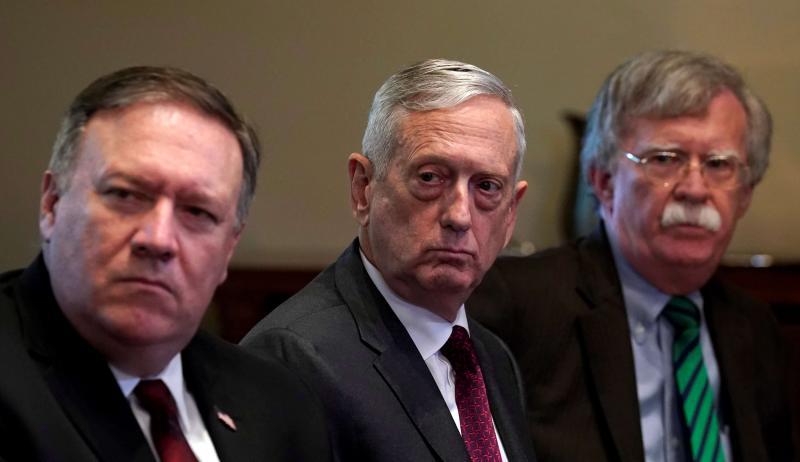Trump’s Middle East policy grows clearer but consequences remain unpredictable
Regardless of whether one agrees with Trump’s vision for the Middle East, his unique style of operation should cause concern to friends and foes alike.
Sunday 10/06/2018
US President Donald Trump has been in office for less than 18 months and already has had two secretaries of state and three national security advisers. The top US diplomat for the Middle East and North Africa region remains a placeholder until the US Congress confirms his Trump-nominated replacement.
Most shockingly, the United States is operating without ambassadors in Egypt, Jordan, Libya, Morocco, Qatar, Saudi Arabia, Sudan, Turkey and the United Arab Emirates.
Nevertheless, Trump’s vision for the Middle East is coming into clearer view through a combination of actions, tweets and the public statements of his latest foreign policy team: Secretary of State Mike Pompeo and national security adviser John Bolton, both of whom appear to have the trust and confidence of Trump.
The driving force behind the administration’s Middle East policy is hostility towards Iran. Since the 2016 campaign, this hostility has often been misrepresented as opposition to the Iran nuclear agreement signed by former US President Barack Obama in 2015. Certainly, Trump has shown a gleeful tendency to undo virtually every action his predecessor undertook but his opposition to the deal was based on arguments that many Democrats share.
It is clear, however, that the administration’s fundamental opposition to Iran is rooted in the Islamic Revolution of 1979 and a desire to overturn it. Pompeo and Bolton seem to view Iran through the same lens that the United States viewed Cuba for more than five decades: a revolutionary country that should be sanctioned to death or until the regime is ousted. Pompeo’s 12 demands on the Tehran regime amounted to a call for political self-immolation.
That policy did not work too well in Cuba, where the Communist Party remains in control.
Trump’s policy of regime change in Iran has led to close ties between the administration and Gulf Cooperation Council (GCC) members, especially Saudi Arabia and the UAE. It echoes the long-advocated policy of Israeli Prime Minister Binyamin Netanyahu.
When you combine this policy alignment towards Iran with the Trump administration’s total disregard for Palestinians, it is no surprise there has been a complete merger of US and Israeli policy, a merger that has been facilitated by a US peace process team composed of people with no diplomatic experience but with deep ties to the Israeli settler movement.
Concerning the Islamic State, the Trump administration continued the policy adopted by Obama and has seen its success — at least on the battlefield. Trump, however, also is eager to disengage the United States from direct military involvement in Syria and Iraq and has called on the GCC and Egypt to replace US troops. Trump appears content to let others — Moscow, in particular — determine the political fate of Syria, so long as the outcome does not violate Israeli interests.
An overarching theme of Trump’s Middle East policy — perhaps, “non-theme” is a more appropriate term — is the administration’s lack of interest in democracy promotion, human rights and civil liberties. Neither Trump nor his closest advisers are neoconservatives who desire to reshape the world in America’s image but, given the political circus in the United States, why would any country want to be reshaped in this image?
Finally, Trump views the Middle East and the rest of the world in balance sheet terms: He seeks economic advantages for US companies, including those run by the Trump and Kushner families, low oil prices, billion-dollar arms sales and as little foreign aid and development assistance as possible. Congress wisely has ignored Trump’s meagre foreign aid proposal.
Regardless of whether one agrees with Trump’s vision for the Middle East, his unique style of operation should cause concern to friends and foes alike. It is a style that has been apparent in his business dealings for decades and one that he has implemented in the White House.
First, Trump does not like process, which may explain his disregard for the US diplomatic corps. He prefers centralised control and wants the Oval Office to be the nexus of all decisions, which he is comfortable making by instinct (if there is anything Trump hates it is information).
Second, Trump likes disruption and keeping people off balance. This may be useful when dealing with adversaries but Trump is non-discriminatory in this regard and has stunned his friends as often as he has his foes.
Finally — and importantly — Trump does not follow through and often leaves it up to others to deal with any unfortunate consequences that derive from his actions. Just ask the many creditors left holding empty bags after Trump’s several bankruptcy filings over the years.
US President Theodore Roosevelt famously described his foreign policy style as “Speak softly but carry a big stick.” Trump’s version is “Speak loudly and let others fix the mess.”
US allies should be alert to this.
Mark Habeeb is East-West editor of The Arab Weekly and adjunct professor of Global Politics and Security at Georgetown University in Washington.
This article was originally published in The Arab Weekly.







